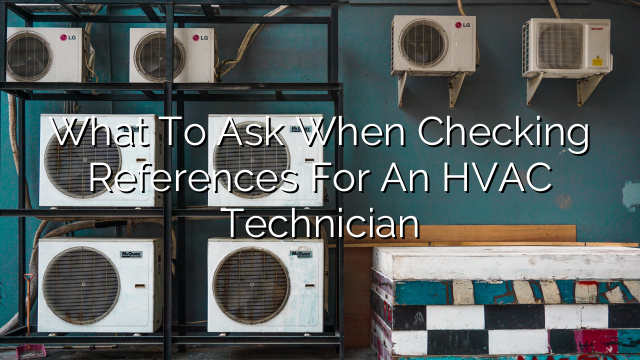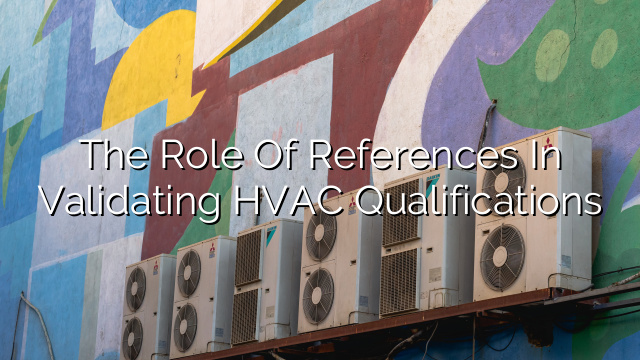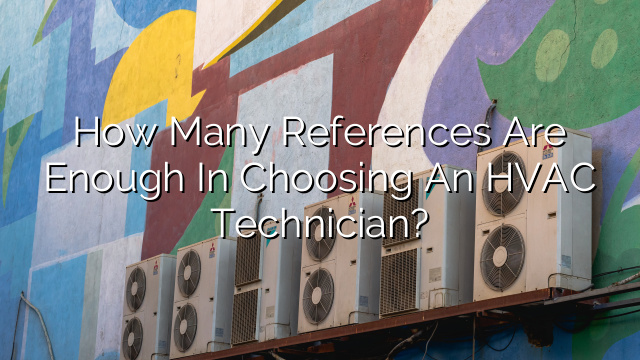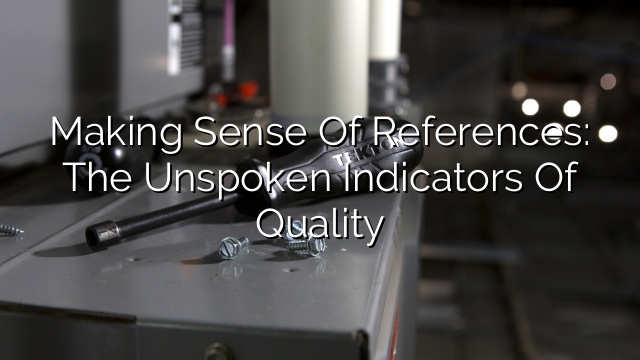The Significance of Reference Checks in the Hiring Process of an HVAC Technician
Finding a trustworthy HVAC technician is critical since heating, ventilation, and air conditioning systems are integral to the comfort and air quality of our homes and businesses. While certifications and experience are essential qualifications for HVAC contractors, reference checks can provide deep insights into the professionalism, skill level, and reliability of the individuals you plan to hire. This blog post explores why conducting thorough reference checks is a cornerstone of selecting the right technician.
Finding Qualified HVAC Professionals
When you’re hiring an HVAC technician, the process should include more than just reviewing resumes and conducting interviews. A technician’s skills, experience, and professional demeanor carry significant weight, and reference checks play a crucial role in verifying these qualities. This section outlines the reasons you should prioritize reference checking in your hiring protocol.
Ensuring Technical Proficiency
Technical skill is the foundation of an excellent HVAC technician’s expertise. References can provide first-hand accounts of a technician’s abilities in troubleshooting, maintenance, and installations. They can also confirm the technician’s knowledge of current industry standards and the use of modern technology in HVAC systems.
Maintaining Safety Standards
Safety is paramount in HVAC work. By checking references, employers can learn if a technician adheres strictly to safety protocols and regulations. A technician with a track record of safe practices is a valuable asset to any team and ensures that both your property and occupants are not put at risk.
Verifying Reliability and Professionalism
Professionalism and reliability translate to showing up on time, completing tasks efficiently, and providing quality customer service. Through reference checks, previous clients or employers can affirm or raise concerns about the technician’s work ethic and professional conduct.
Assessing Customer Service Skills
HVAC technicians often work directly with clients, so strong communication skills and a customer-focused approach are vital. References can reveal how well the technician handles customer queries, resolves issues, and maintains satisfaction.
How to Conduct Effective Reference Checks
To get the most out of reference checks, there are critical steps to follow and questions to ask that help reveal the full picture of a technician’s qualifications and work habits. Below are some guidelines.
Request Professional References
- Always ask for a mix of professional references that may include previous employers, coworkers, and clients.
- Explain the importance of speaking with references to the job candidate and secure their permission before reaching out.
- Inquire about the nature and duration of the relationship to understand the context of the reference.
Ask the Right Questions
- Focus on relevant experiences that directly align with the responsibilities of the HVAC technician role.
- Ask open-ended questions that encourage detailed responses rather than yes/no answers.
- Probe for specific instances where the technician demonstrated key competencies or addressed challenging situations.
Listen for Consistency
- Consistency in the information provided by different references can affirm a candidate’s claimed skills and history.
- Conversely, discrepancies should be investigated further as they could be red flags about the candidate’s reliability or honesty.
- Note the tone and enthusiasm of the reference when speaking about the candidate, which can reveal more than their spoken words.
Check for Red Flags
- Promptness and reliability concerns raised by multiple references could indicate a pattern of behavior rather than isolated incidents.
- Similarly, issues with compliance to safety protocols should be taken very seriously.
- Avoid candidates with a history of conflicts or negative interactions with clients and coworkers.
Navigating the Legalities of Reference Checking
While conducting reference checks is crucial, it’s also important to navigate the legal landscape surrounding these inquiries responsibly. Privacy laws, employment laws, and defamation concerns can all come into play when seeking out this kind of background information.
- Be aware of and comply with regulations regarding reference checks — this may include laws at the state and federal level.
- Ask for a candidate’s consent before conducting reference checks, preferably in writing.
- Stick to questions that are strictly professional in nature to avoid violating privacy rights or other legal protections.
Conclusion
Reference checks are a vital, if sometimes overlooked, element of hiring an HVAC technician. They complement the information gleaned from resumes and interviews, providing a three-dimensional view of a candidate’s past performance and future potential. By conducting comprehensive reference checks, you can significantly increase the likelihood of bringing on a technician who will be a reliable, skilled, and safe addition to your team.
FAQs
What information can I legally obtain during a reference check?
During a reference check, you can legally obtain information regarding the candidate’s employment dates, job title, job duties, and reason for leaving past employment. Stick to questions that relate directly to the candidate’s professional qualifications and conduct.
How many references should I check for an HVAC technician?
It’s advisable to check at least two to three professional references to obtain a well-rounded view of the candidate. This should ideally include direct supervisors and, if applicable, customer references.
Can I do reference checks for freelance or independent contractor HVAC technicians?
Yes, reference checks are essential for freelance or independent contractor HVAC technicians as well. Prior clients and subcontractors can provide valuable insights into the technician’s work quality and ethics.
What if a reference provides negative information about the candidate?
If a reference provides negative information, assess the context and credibility of the feedback. If possible, seek additional references to confirm the validity of the concerns raised.
Is it necessary to inform the candidate about the outcome of the reference checks?
While it’s not always legally required, transparency is generally a good practice. If you decide not to proceed with the hiring based on reference checks, providing this feedback can be helpful for the candidate’s professional growth.










